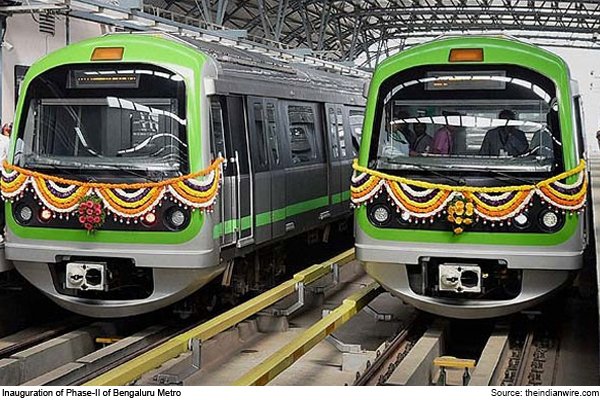New Delhi: Minister of State (Independent Charge) for Housing and Urban Affairs Hardeep Singh Puri, Union Chemicals and Fertilizers Minister Sadanand Gowda, and Honorable Chief Minister of Karnataka B.S. Yeddyurappa today flagged off the train from Yelachenahalli to the Silk Institute metro stations, inaugurating the 6-km-long southern extension line under Phase-2 of the Namma Metro. The inauguration of the metro extension line and FOB today is a step towards the Bengaluru Mission, 2022 targets, to enable faster traffic and smart mobility options in the city.

The Bangalore Metro Rail Project Phase-2 consists of 62 stations on a 74-km-long route and includes expansion of both the purple and green lines of Phase-1 and two new lines in a total of 34 kilometers in all four directions. These two lines include the 21 km long Gotigere-Nagawada route and the 19 km long RV road – Bommasandra route. The project is being completed at a cost of Rs 30,695 crore. The operational line currently consists of 5 new stations ahead of Yelachenahalli Metro Station, namely Konkankunte Cross, Dodokallasandra, Vajarahalli, Thalaghattapura, and the Silk Institute.
The expansion includes a 6 km long elevated metro on the southern side of the currently operational 24.2 km long green (north-south) line. With this expansion, the N-S corridor will become 30.2 km long. The elevated part consists of 213 spans (bridges). The work includes 1032 piles for superstructures, 223 piers, and 665 girders in 1998 segments and stations. 2,10,965 less concrete and 20,500 metric tons of steel have been used in it. In addition to the ‘State of the Art Equipment’, 765 km of cables and wires of various sizes have been laid for electrical works, signaling and telecommunications. Some of the features of the metro are as follows.
For the convenience of passengers, 8 escalators and 4 elevators have been installed at each station, making a total of 40 escalators and 20 elevators.
Rooftop solar equipment of a total of 1.2 MW capacity is being installed at all 5 stations of this extension line. The target is to set up solar power plants by March 2021. This is the first time in Bengaluru Metro that solar power plants are being installed here.
Energy-efficient LED lights have been provided to all 5 stations.
An entry facility has been provided on all stations at the new service road. The pick-up and drop area has been earmarked for the bus corridor, taxi, and auto on the service road.
Facilities such as ramps, elevators, separate toilets, touch ways, and fixed places in trains have been provided for physically challenged and blind people.
Multi-model integration
Special mode change service lanes have been created on both sides of the 5 stations to locate bus bases and provide space for intermediate public transport (IPT).
One country one card
The Bengaluru Metro has used special technology for the Automatic Fare Collection (AFC) system, which facilitates travel using One Loop NCMC ‘One Country One Card’ with the inauguration.
The AFC system is also being upgraded at 40 stations of the 42 km long network currently operational for NCMC.
The target is to provide NCMC based ticketing service for all the journey before 15 August 2021 on all lines including the Phase-I lines. Subsequently, passengers across the 55-km-long metro network, including the western extension in Bengaluru, can use the RuPay card or any other NCMC compliant bank card to pay for their journey.
